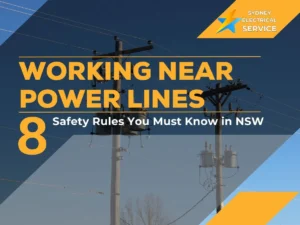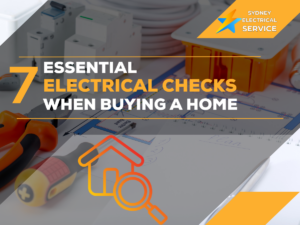Google Reviews ⭐⭐⭐⭐⭐

What Are the Risks of DIY Electrical Work?
Even if you think you are pretty handy around the house – DIY electrical work is never worth the risk
It puts yourself and other people in danger. It puts you at risk of financial ruin and legal trouble. And in the worst case scenario the consequences can be fatal. Even a minor electrical repair job can put you at risk.
For these reasons, you should always have your electrical system installed, repaired, and serviced by a certified electrician in Sydney with a current license and insurance. This way, you have peace of mind knowing your electrical system is safe, reliable, and compliant with industry standards.
First, a little-known risk that could land you in financial hot water…
Unlicensed Electrical Work is Illegal
Under section 18 of the Electrical Safety Act 2002 it is illegal to carry out unlicensed electrical work. But what does the Act define as ‘electrical work’?
Under the Act it considers electrical work to be “the manufacturing, constructing, installing, testing, maintaining, repairing, altering, removing, or replacing of electrical equipment.” Some examples of electrical work include replacing a light switch, changing the location of an existing power point, installing a ceiling fan, and constructing an extension lead.
If you perform any of these and other tasks – for yourself or anyone else – without a license you could be forced to pay up to $40,000 in fines. More severe penalties apply for unlicensed electrical work done by a corporation.
Issues of unlicensed electrical work are routinely investigated by Electrical Safety Inspectors.
Your Insurance Won’t Cover Damage
If a fire or electrical fault does occur in your home or business, your insurance company may not cover the cost of damage if the cause is due to unlicensed electrical work.
This applies to any kind of insurance whether it be home and contents insurance or business insurance. On top of this, if you have work done by an unlicensed electrician in Sydney (including you), then you won’t be entitled to compensation if the work injures you or your family.
It’s Dangerous
Obviously, electricity is dangerous. Any electrical work done by you puts you at risk of serious injury and death. This could be an electrical shock from an exposed wire or a faulty appliance. Or the increased risk of an electrical fire due to a circuit overload, surge, or a deadly amount of current.
Some of the most common ways DIY electrical work can be dangerous is:
- Incorrect fitting of switches and outlets – A loose electrical outlet or switch can cause an appliance to malfunction (i.e. ceiling lights flicker), surge, or overheat. This is made even worse if an electrical wire becomes loose from the terminal.
- Replacement of the wrong fuse type – When a fuse is blown or tripped and then replaced with a larger sized fuse this can increase the risk of an electrical fire. If ever a fuse or breaker suffers a fault then have the entire electrical system inspected by a licensed electrician.
- Incorrect wattage of lightbulb – When you replace a lightbulb you must make sure the new bulb does not have a greater wattage than what the socket can handle. Otherwise, the bulb may overheat and either shatter or catch on fire.
- Upgrading the electrical box – The purpose of an electrical box (junction box) is to house various electrical wires and protect them from the elements. Any attempt to modify or upgrade the electrical box beyond its intended capacity can increase the risk of overheating and short-circuiting.
To ensure that your electrical system is safe, efficient, and compliant with industry standards, always have your electrical utilities routinely inspected and serviced by a licensed electrician in Sydney.












